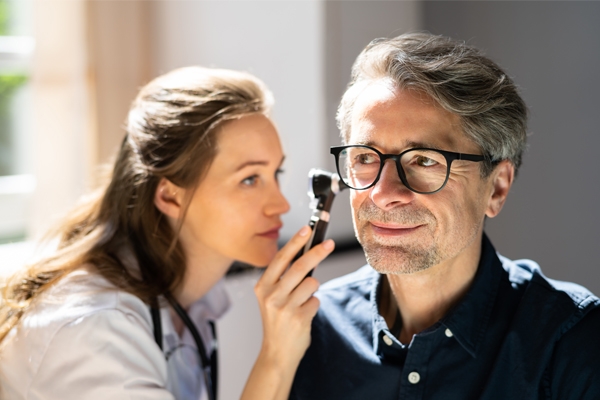Exploring Hearing Loss and the Human Hearing Range


Exploring Hearing Loss and the Human Hearing Range
10 min
Published July 11, 2024
Human Hearing Range and Hearing Loss
Hearing, a sense so vital to our daily lives, allows us to connect with the world in profound ways. It's how we tune into our favorite songs, heed a friend's laughter, and perceive the vibrant sounds of life all around us. Yet, the human hearing range is a marvel of biology that many of us take for granted until facing challenges like hearing loss. AudioNova is stepping up as a visionary in the AudioCare industry, shining a light on how essential understanding and managing our hearing health truly is.
With a pledge to offer unparalleled expertise, innovative solutions, and a guiding hand to those navigating their hearing health, we are here to enhance your life by unlocking the full potential of your hearing capabilities.
How We Hear – The Basics
Our ears are extraordinary organs designed to capture sounds from our environment. Sound waves enter the ear canal, causing the eardrum to vibrate. These vibrations are transferred to the inner ear, where tiny hair cells send electrical signals to the brain, which interprets them as sounds. Our sound perception is an intricate process that allows us to enjoy conversations, music, and all the subtle noises in our daily surroundings.
The Human Hearing Range
The human hearing range is quite amazing, allowing most people to hear sounds from 20 Hz up to 20,000 Hz. This frequency range covers everything from the softest whisper in a quiet room to the low, distant roll of thunder on a stormy night and the high pitch of a bird’s chirp.
The sounds we hear in our day-to-day life usually fall between 2,000 and 5,000Hz, the same range where human speech lives, especially between 2,000 and 4,000Hz. But as we get older or encounter certain circumstances, our normal hearing range can become compromised.
When we age, our ears start to lose the ability to detect higher-pitched sounds. For example, while teenagers can hear sounds up to 17,000Hz, folks in their fifties may find sounds above 12,000Hz slipping away from their hearing range. At first, this shift mainly affects the ability to hear the higher part of the frequency range, showing how our hearing evolves with time.
The Primary Factors That Impact Our Hearing
Hearing loss doesn't usually happen overnight – it's often a gradual process influenced by various factors. One primary reason is aging, as our body's elastin production decreases. This reduction in elastin affects the flexibility of tissues throughout our body, including those in the ear, making the ear's complex mechanisms less efficient.
Loud environments also play a significant role, where prolonged exposure to high decibel levels (/too-loud) can harm the tiny, hair-like cilia in the inner ear. These cilia are crucial for transmitting sound vibrations to our brain, and once damaged, they don't regenerate, leading to diminished hearing capabilities.
Chronic health conditions such as diabetes or heart disease negatively impact our overall health and can contribute to hearing loss by affecting blood circulation, including to areas involved in hearing. Certain medications have the unfortunate side effect of impairing hearing. Because this happens so gradually, many don't realize their hearing has declined until it has become a significant issue. Our hearing doctors at AudioNova aim to educate and provide supportive solutions that promote a proactive approach to optimizing the hearing health of those experiencing these challenges.
Recognize Early Signs of Hearing Loss
Hearing loss sneaks up quietly and often goes unnoticed until it starts interfering with our daily lives. For many, the early signs of hearing loss are invisible, with no immediate symptoms that shout for attention. It's surprising that our ability to hear high frequencies often begins to fade in our 30s, but most of us might not feel it's affecting us in any real way. This silent progression makes understanding and spotting the early signs critical for getting a hearing test and seeking the support needed to maintain our hearing health and overall quality of life.
Struggling with Conversations – It becomes hard to keep up with conversation when there's background noise, like in a crowded restaurant. Even if someone is speaking clearly, it's tough to catch every word they say.
Muffled Sounds – Everyday noises and people's voices start to sound as if they're coming through a thick wall, making it hard to understand what's happening around you.
Increasing Volume – You find yourself reaching for the remote to turn up the volume on the TV or radio more than you used to, needing it louder to make out what's being said.
Asking for Repetitions – Conversations often have you asking others to repeat themselves, speak up, or slow down because their words just aren't coming through clearly.
Ear Pain – There's discomfort or a continuous ache in your ears that wasn't a problem before, making you aware something's not right.
Tinnitus – Hearing a ringing, buzzing, or another noise in your ears that others can't hear becomes a common, nagging presence, indicating a potential hearing issue.
Get Back to Clear Hearing with AudioNova
Noticing changes in your hearing can be unsettling, but AudioNova is here to guide you back to clarity. Seeing an audiologist for a hearing check as soon as you recognize any difference is crucial. While many kinds of hearing loss are manageable with the right types of hearing aids, sometimes these changes indicate other health issues. Catching these early means better treatment, keeping both your hearing and overall health from getting worse.
AudioNova isn't just a hearing aid clinic – we provide a complete check-up and treatment approach for your hearing concerns. Consider booking a consultation with us to address any hearing issues early, ensuring you're taking the right steps toward clear hearing.




